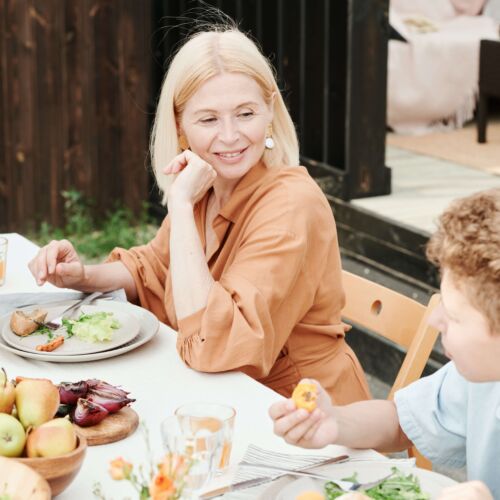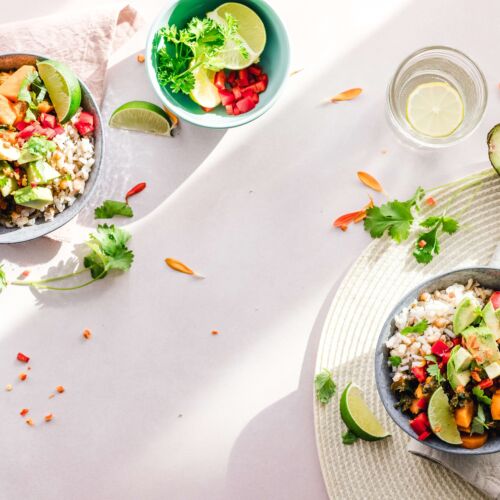5 Tips on How to Make Peace with Food
by Dawid Furman

Making Peace With Food is the third principle of Intuitive Eating outlined by Tribole & Resch in the Intuitive Eating Workbook.
Not allowing yourself to eat specific foods which you may like may lead to obsessive thinking about them which may cause overeating.
This is known as the “Rebound Effect,” as it causes a disconnection of mind from body and stops you from making rational choices in regards to eating.
This is why making peace with food is a vital process in Intuitive Eating as making peace with food by using your emotions to choose foods you desire in regards to your needs will make your life much happier without any guilt or shame.
Allowing yourself to consume foods you like, without putting any foods off limits will allow yourself to truly enjoy your food without worrying about overeating.
According to Lindsey McGregor RD, “this is one of the most surprisingly challenging steps of Intuitive Eating as it asks for you to regain trust with your forgotten intuitive signals. It is not uncommon to require the support of a Dietitian with this step.”
1. Give Yourself Unconditional Permission to Eat
Deprivation of food causes a longing effect, where you just crave the food.
Suppressing yourself from eating and abiding by strict diet rules may be all effective until something goes wrong, and you give into the cravings and all your food rules go out the window.
This may cause you to overeat, and you will say to yourself that you will start again tomorrow however the process will happen over and over again.
Make a list of foods you restrict yourself from eating and reflect on the thoughts as well as the mind body connection you had when last eating this food. Also reflect how eating it affects your mood, self-esteem and you’re eating for the rest of the day.
This is why if you give yourself unconditional permission to eat these foods, the less enticement they will offer you, and you will not find the idea of consuming it as attractive.
Chloe the cat knows this effect all too well.
2. Get Rid of Fears Holding You Back
The fear of eating a forbidden food may be the reason you can’t stop eating it as you may think if you already broke the rule and the damage is done,
Fear takes your peace and freedom from eating away and makes eating seem like a scary experience.
Think of some of the fears that may make you stop eating certain foods and reflect on these fears in a self-compassionate, non-judgmental manner.
For example, if you fear that your family or friends will criticize your food choices if you eat a certain food, reflect on this thought by thinking that only you can know your own thoughts, feelings, emotions as well as hunger and fullness levels.
3. Assess Your Readiness to Make Peace with Food
It is important that you assess how ready you are to learn new experiences and take on new challenges in regard to food by answering a number of questions which can be found below:
| Yes | No | |
| 1. I have an environment where I can eat in peace without any distractions | ||
| 2. I can identify important vulnerability points, such as stress or tiredness | ||
| 3. I can identify my biological hunger cues, such as being extremely hungry, to pleasantly or gently hungry. | ||
| 4. I can identify fullness cues, which range from being slightly hungry to being absolutely full. | ||
| 5. I can identify between the uncomfortable sensation of guilt as well as the uncomfortable sensation of being overly full. | ||
| 6. I can cope with my feelings without using food. | ||
| 7. I can distinguish between feeling like having a meal and feeling like having a snack. | ||
| 8. I can experience pleasurable satisfaction from eating a meal. | ||
| 9. I can handle being too full from eating, without trying to make up for it by exercising or skipping meals. | ||
| 10. My food choices are not affected by others’ opinions. |
If you are ready to make peace with food you should have answered yes to most of the questions, however, remember that this is not a pass or fail assessment and is okay if you answered no and may not feel ready to go forward.
It is important that you continue at a pace you find comfortable. If you don’t feel ready, then take the most time tackling the issues you have the most problems with.
For example, if you are an emotional eater you may want to focus on this issue first and think of solutions before proceeding to the next concern.
4. Make the Best of Your Experience
To make the best of your eating experience when making peace with food it is important to do so in a safe environment while checking in during the process.
You can practice this by consuming a food of your choice in a place you feel comfortable and safe in, usually when not really hungry, such as an hour after dinner.
Next, reflect on how you feel before, during and after the meal and describe and ask yourself did the taste meet your expectations or would you do something differently?
Every time you give yourself permission to eat a food you would have previously considered forbidden, make a chart with information on your experience to give yourself permission to eat it and whether it was a success or not.
If you found this blog post interesting, please continue reading our 10-principle series on Intuitive Eating. Intuitive Eating is challenging but with the help of a Registered Dietitian it is common that clients will break through and get off their diet rollercoaster for the long haul and open up space in their life to feel more freedom.
If you are interested to learn more about Intuitive Eating, continue on reading:
- Ditch The Diet Mentality
- Honor Your Hunger
- Make Peace With Food
- Challenge The Food Police
- Feel Your Fullness
- Discover The Satisfaction Factor
- Cope with Your Feelings Without Using Food
- Respect Your Body
- Exercise: Feel the Difference
- Honour Your Health: Feel the Difference
Find Your Registered Dietitian here:
On Dietitian Directory you can find all sorts of Dietitians including Intuitive Eating Dietitians, Weight Inclusive Dietitians, Mindful Eating Dietitians and Emotional Eating Dietitians
About the Author: Dawid Furman is a nutrition and exercise science student studying at the South East Technological University in Ireland and hopes to pursue a career as a dietitian in the future.
Reviewed by: Lindsey McGregor, RD
Images from: Unsplash and Pexels
The Site is not intended to be a substitute for professional advice. Under no circumstances will we be liable for any loss or damage caused by your reliance on information obtained through the Site. You are responsible for evaluating the accuracy, completeness, or usefulness of any information, opinion, advice, or other content available through the Site. Please seek the advice of professionals, as appropriate, regarding the evaluation of any specific information, opinion, advice, or other content. Never disregard professional advice, including medical advice, or delay in seeking it because of something you have read on this Site.



